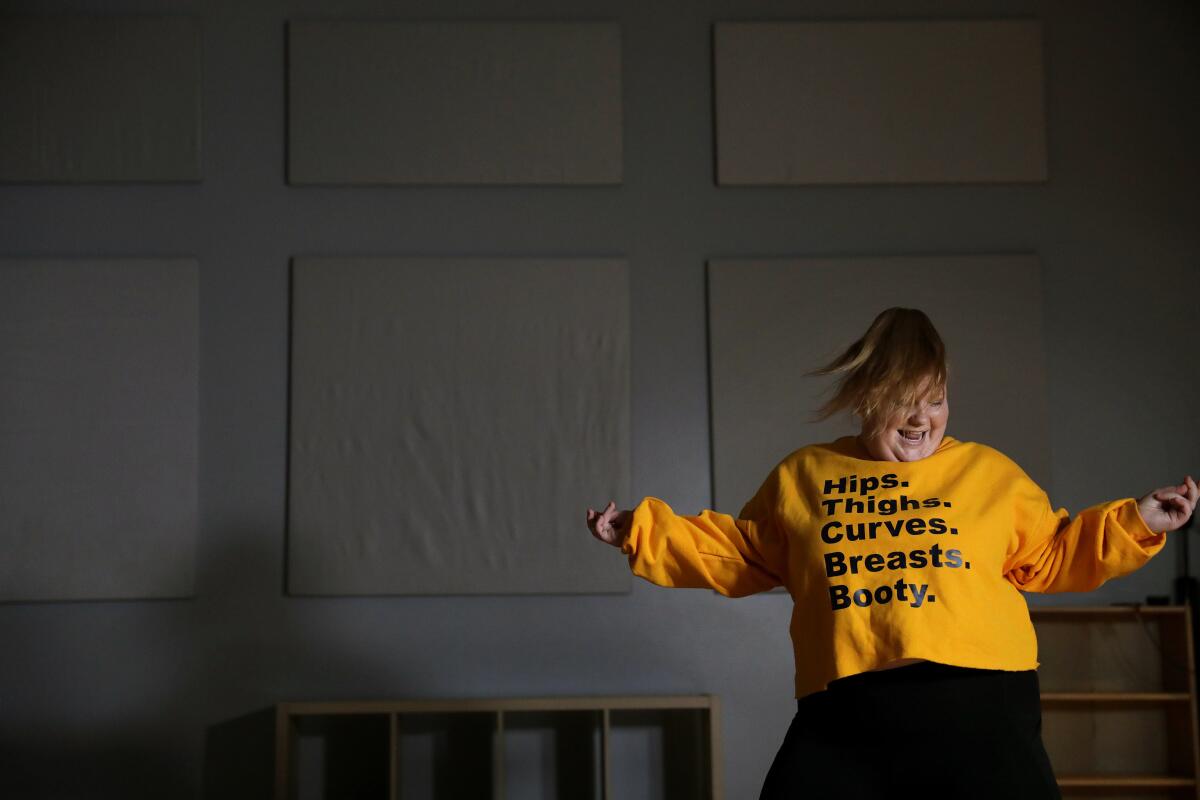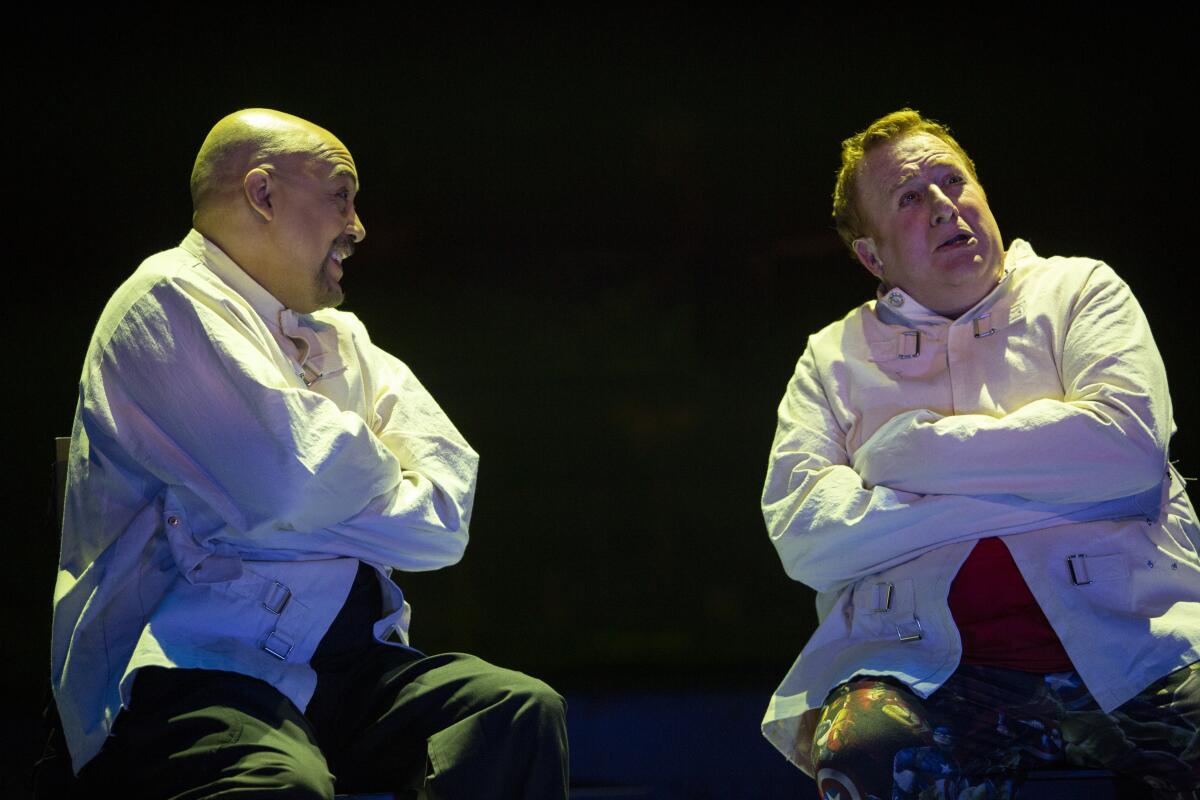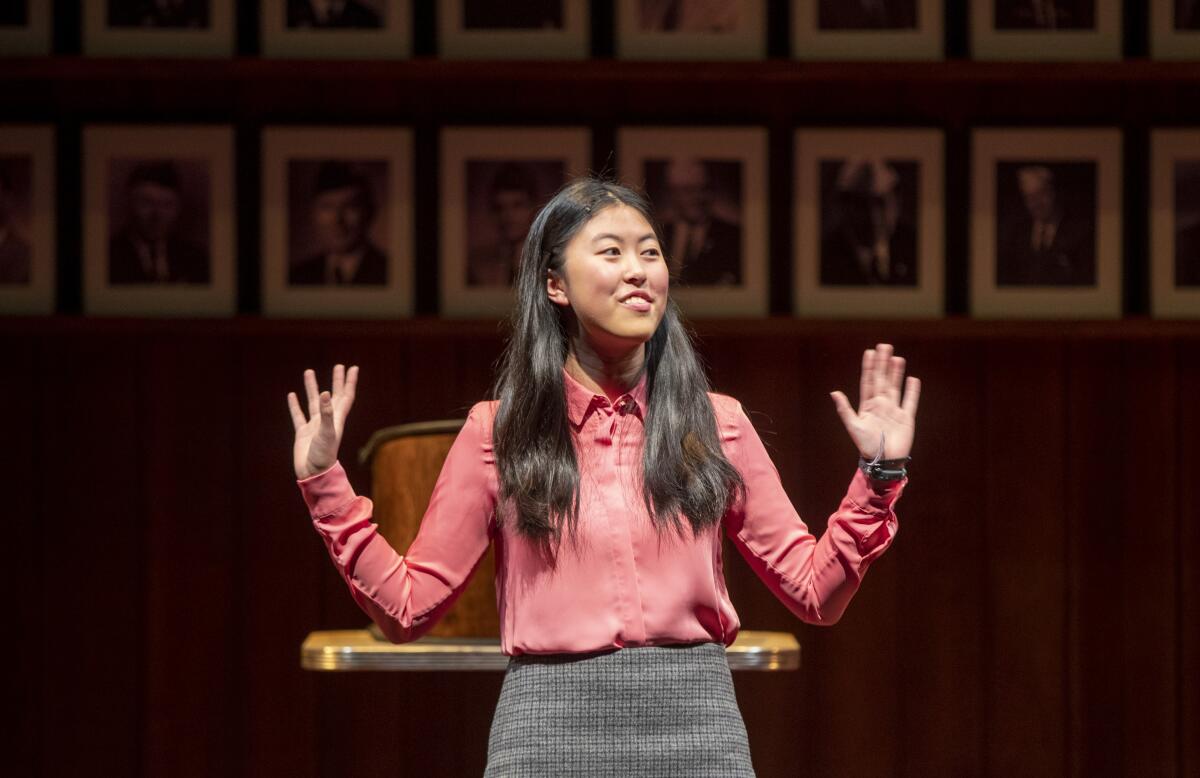Newsletter: Essential Arts: The outsider dancers using social media to reinvent the form

- Share via
It’s January, and we feel like grooving at the L.A. Times. This week, we are focused on dance. I’m staff writer Carolina A. Miranda with this and other essential arts news.
Essential image
A group of Latin American street artists has turned the Fullerton Museum into a riot of color.
Reinventing dance
“Dancers who were once deemed too fringe,” writes The Times’ Makeda Easter, “are breaking into the mainstream.” And that’s because social media platforms can elevate the profiles of those who don’t fit the mold. Easter follows dancers with nontraditional body types, others who fuse Bhangra and funk and one who created a troupe for performers in wheelchairs — performers who have ultimately been catching the attention of Beyoncé and Rihanna.
Make the most of L.A.
Get our guide to events and happenings in the SoCal arts scene. In your inbox every Monday and Friday morning.
You may occasionally receive promotional content from the Los Angeles Times.
“I think it’s incredible that dancers are now being recognized,” said veteran dancer and choreographer Tricia Miranda. “They’re not looked at as props and background. People actually know these dancers by name.”
Be sure to click through. The videos will make you want to ... dance.

Since we’re talking dance: BTS just dropped the single “Black Swan,” and the video features a performance by Slovenian dance company MN.
Plus, Merce Cunningham in images.
Classical notes
A recent spate of concerts around L.A. has paired contemporary composers and classical ones, including a show at the Wallis that presented Philip Glass and Beethoven, who turns 250 this year and will therefore be surfacing all over. The Glass was “gripping,” writes Times classical music critic Mark Swed, but “the challenge of Beethoven 250 will be to retain a Beethoven who is among us but refuses to fit in.”
When George Walker died two years ago at the age of 96, the African American composer had a rack of awards, including a Pulitzer. And though he is essential to the American canon, notes Swed, he remains relatively unknown. “About the only month in which I ever encounter a piece by Walker on a concert program is February, because that is Black History Month,” he writes. That, however, may be about to change.
Swed also reviews the Long Beach Opera’s production of Purcell’s “King Arthur” with an updated look and setting and an Arthur who echoes our times — “the comic book delusional fantasy of a pudgy, narcissistic, emigrant-phobic politico requiring psychiatric treatment.”

Zubin Mehta led the L.A. Phil through Webern’s Six Pieces for Orchestra, Opus 6, the work he conducted when he first made his West Coast debut in 1961. Fifty-nine years later at Disney Hall, he was back with the same music, writes Swed, “its tiny wisps of melody, minimal sound effects and harmony more implied than revealed stirred surprisingly large and lasting emotions.”
On the stage
The Times’ Ashley Lee reports that “Rock of Ages,” the immersive stage musical full of ’80s jams that is set inside a Hollywood nightclub, is back in Los Angeles — at a Hollywood nightclub. And it’s designed to make money, stocked with its own bar, called the Bourbon Room, that starts pouring two hours before the show starts and “keeps pouring long after it’s over.”
Lee also has a story on the Sherman Oaks high school debater who appears in Heidi Schreck’s award-winning play “What the Constitution Means to Me,” which opened this week at the Taper. Jocelyn Shek shows up in a key debate scene opposite actress Maria Dizzia. “I like it because it’s helped me learn a lot about my world, and it’s really shaped the way I think about things,” she tells Lee. “And, well, I really like to argue.”

Donja R. Love’s “Fireflies” is on the stage at South Coast Repertory. The play, about a couple that bears much resemblance to Martin Luther King Jr. and Coretta Scott King, writes contributor Margaret Gray, is “choreographed with pitch-perfect verve by director Lou Bellamy.”
Plus, Jessica Gelt has the list of this year’s Ovation Awards winners. The Pasadena Playhouse’s “Ragtime” took the honors for best production and direction of a musical, while the Fountain Theatre’s “Cost of Living” received the award for best play in an intimate theater.
Consider subscribing to the Los Angeles Times
Your support helps us deliver the news that matters most. Become a subscriber.
In the galleries
Contributor Leah Ollman reviews a show by Keita Matsunaga at Nonaka-Hill that fuses sculpture and architecture. “His ceramic sculptures engage the same fundamentals as architecture: site, function and the shaping of space,” she writes. “The works in his first U.S. show are enrapturing.”
Also on the docket are Kathleen Henderson’s “blistering” drawings at Track 16, in which “greed, pride and vanity play out in oil stick on paper — raw impulses matched by raw, urgent line.”
Criticism is not dead
This week I’ve been sucked into a wormhole of criticism, and criticism about criticism. (I blame it on the flu I am nursing.) It started with this story by Theodore Gioia about the midlife crisis of the American restaurant review in the L.A. Review of Books.
This led me to the San Francisco Chronicle’s Soleil Ho, who recently published a list of the “most despair-inducing” meals in the Bay Area in 2019. (“It ends up tasting heavy, a culinary boot stomping on your face.”) Which led me to this classic review of Paris’ Le Cinq by Jay Radner. (“The dining room, deep in the hotel, is a broad space of high ceilings and coving, with thick carpets to muffle the screams.”)
This, and the Mucinex-D, took me to Lauren Oyler’s poker-faced slam of Jia Tolentino’s book “Trick Mirror” — with its echoes of Renata Adler/Pauline Kael — and Parul Sehgal’s review of Jeanine Cummins’ new novel “American Dirt.” (“Allow me to take this one for the team.”)
I then circled back to my colleague Lucas Kwan Peterson’s epic review of the Chateau Marmont’s Japanese restaurant, which not only skewered the food (“like licking the inside of a fish tank”) but also showed him wrestling with the task of separating art from artist in the era of #MeToo. A stellar piece of writing that Gioia, regretfully, overlooked.
Ready for the weekend
Matt Cooper has the week ahead in museums, music, theater and dance, and he has the definitive list of the 11 best things to do in L.A. over the holiday weekend, which includes a performance about joy by Contra-Tiempo at the Wallis.
And I round up what’s doing in the white boxes in my weekly Datebook, including a show by Venice painter Charles Arnoldi at the Fisher Museum at USC.
In other news
— Gustavo Dudamel has extended his contract with the L.A. Phil through 2025-26.
— The fate of Notre Dame remains uncertain. Critic Philip Kennicott has an extensive, graphics-filled report.
— Contesting the myth of the artistic genius.
— Judy Chicago and Jill Soloway will be headliners at L.A.’s Felix art fair.
— Ed Ruscha‘s latest works evoke the language of his youth in Oklahoma.
— How L.A. artist Carmen Argote raises the issues of economics (her own) in her work.
— On what it means to be a contemporary artist in Afghanistan.
— Uri D. Herscher, founder of the Skirball Cultural Center, is retiring. His successor is civil rights lawyer Jessie Kornberg.
— The New York Times reported on harassment allegations against a Philadelphia museum leader who later went on to direct another museum. After the story ran, he was forced out amid complaints.
— Arms manufacturer Warren Kanders stepped down as trustee at the Whitney Museum after it was uncovered that his tear gas was used at the U.S.-Mexico border. In a new interview, he decries “weak” museum leadership.
— “All we said to America is be true to what you said on paper.” In honor of MLK Day, a fragment of Martin Luther King Jr.’s last speech.
And last but not least ...
Somebody please re-stage this incredible performance at Frieze.
The biggest entertainment stories
Get our big stories about Hollywood, film, television, music, arts, culture and more right in your inbox as soon as they publish.
You may occasionally receive promotional content from the Los Angeles Times.




